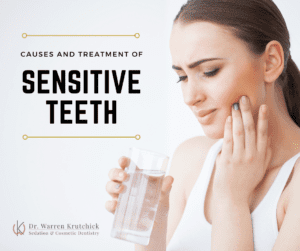If a sip of hot tea or a taste of ice cream makes you wince, you may be suffering from teeth sensitivity. According to the Academy of General Dentistry, about 40 million Americans experience some form of tooth sensitivity. So, if brushing or flossing has been causing you some pain, you’re not alone.
Teeth sensitivity is generally the result of worn tooth enamel or an exposed tooth root. While it’s common for hot or cold foods to trigger some tooth sensitivity, any associated pain may be caused by other dental issues.
There is good news—most causes of sudden tooth discomfort are easily treatable by a dentist. However, it’s a good idea to first understand what you may be doing to cause this oral issue.
What Causes Teeth Sensitivity?
A common question for those suffering from tooth discomfort is, why do my teeth feel sensitive all of a sudden? Most often teeth sensitivity is caused when the tooth’s enamel is worn down from:
- using a hard toothbrush.
- brushing your teeth too hard.
- consuming too many acidic foods or beverages.
- grinding your teeth at night.
- overusing certain tooth-whitening products.
Other causes include receding gums, which leads to sections of the tooth becoming exposed and unprotected, as well as tooth decay, broken teeth, and worn-down fillings or crowns.
Treating Sensitive Teeth at Home
Preventing tooth sensitivity and most oral health problems begins with good oral hygiene. For mild tooth sensitivity, there are also some over-the-counter dental treatments that may help:
- Choose a toothpaste that’s created specifically for sensitive teeth. These kinds of toothpastes generally don’t contain irritating ingredients. Instead, they may have desensitizing ingredients designed to block the discomfort.
- Use a softer toothbrush and brush with a gentler touch.
- When using a mouthwash, choose one that is alcohol-free because it will be less irritating to sensitive teeth.
- Use a mouth guard at night if you grind your teeth.
Keep in mind it may take several applications for these remedies to work. If you don’t see improvement within one week, or if you are experiencing pain, call our office for an appointment to discuss further options.
In-Office Treatments for Teeth Sensitivity
If at-home treatments don’t work, talk to us about prescription toothpaste and mouthwash. Other options, such as fluoride gel or prescription-grade desensitizing agents, may be effective in strengthening the enamel and protecting your teeth.
Most importantly, if you have pain in your teeth, call us for an appointment so Dr. Krutchick can identify or rule out any underlying causes. In most cases, seeing us right away helps prevent your problem from getting worse, like leading to a serious infection.
Because extremely sensitive teeth are most often the result of a more complex dental problem, it’s important to see a dentist and have the issue treated directly.
